2023 CU ASPIRE Program Awardees
The School of Medicine’s Program to Advance Physician Scientists and Translational Research is pleased to announce its 2023 CU ASPIRE Program awardees. This year’s awards have been made to four teams led by Drs. Brianne Bettcher, Craig Jordan, Traci Lyons, and Carmen (Kika) Sucharov. These teams include faculty from seven departments across the School of Medicine.
The CU ASPIRE Program is designed to facilitate collaborative research groups working on unmet needs in basic science or clinical medicine that can only be addressed by a team of investigators through programmatic research. The Program supports milestone-driven collaborations between investigators across campus with the goal of submitting a program project (P01 or similar) or other large multi-project grant proposal to federal funding agencies upon completion of the internal award. Last year the ASPIRE Program supported four research groups led by Drs. Fernando Holguin, York Miller, Ram Nagaraj, and Beth Tamburini, and three of these programs are already seeking extramural support for their programmatic research.
The CU ASPIRE Program is led by David Schwartz, MD, Director of the School of Medicine Program to Advance Physician Scientists and Translational Research and Lori Sussel, PhD, Vice Chancellor for Basic Research, along with Dr. Laura Buccini, DrPH, Senior Director of the Vice Chancellor’s Office of Research Development and Strategy, and Jennifer Kemp, PhD, Associate Director of the SOM’s Program to Advance Physician Scientists and Translational Research. This group provides ongoing advice and guidance to each of the ASPIRE-supported research groups in their quest for programmatic research support. This year, the Cancer Center has joined the CU ASPIRE Program to support funding for cancer-related team science on campus.
In the fall of 2023, the Program will release a call for applications for 2024 funding. The Program is open to teams from all Schools/Colleges across the Anschutz Medical Campus.
Team 5 (Bettcher)
Leveraging Microstructural Neuroimaging Techniques to Understand Biological Pathways of Decline: A Neuroimmunological Approach to Alzheimer’s Disease
The team led by Dr. Bettcher aims to elucidate how immune dysfunction and Alzheimer’s disease-related pathology impact cognitive decline in late life, with an emphasis on microstructural changes to neuritic density and complexity in the brain as potential mediators of clinical progression. Their interdisciplinary team includes Drs. Bettcher, McConnell, Thaker, Potter and Carlson, combining unique interdisciplinary expertise in the fields of neuropsychology, immunity, neurology, Alzheimer’s disease biomarkers, neuroimaging and biostatistics. While interest in immune and neuroanatomical mechanisms of late life decline have garnered significant research interest in the past decade, no studies to date have utilized the multimodal techniques this team will employ – including Neurite Orientation Dispersion and Density Imaging (NODDI) - in tandem to understand pathways of decline in late life. By investigating how an immuno-neuritic nexus of dysfunction interacts with canonical Alzheimer’s disease biomarkers, Bettcher’s team will be able to better characterize and understand complex microstructural events in vivo that presage gross neuronal loss.

Brianne Bettcher, PhD
Associate Professor of Neurology
Department of Neurology, Behavioral Neurology Section
Dr. Bettcher is a neuropsychologist and director of the Colorado Aging Brain Laboratory. Her research focuses on elucidating the contribution of immune dysregulation – both peripherally and centrally - to pathological aging and Alzheimer’s disease trajectories.

Brice McConnell, MD, PhD
Assistant Professor of Neurology
Department of Neurology, Behavioral Neurology Section
Dr. McConnell is a physician scientist and director of the Sleep Research Program at the University of Colorado Alzheimer's and Cognition Center. He is leading efforts to understand the neuroprotective aspects of sleep that protect the brain from age-related neurodegenerative diseases, including Alzheimer's disease, and he is conducting diagnostic research on sleep and memory.

Huntington Potter, PhD
Kurt N. and Edith von Kaulla Memorial Professor of Neurology
Dr. Potter is the Vice Chair for Basic Research in the Department of Neurology, the Director of the University of Colorado Alzheimer’s and Cognition Center, and Director of the Alzheimer’s Disease Program, Linda Crnic Institute for Down Syndrome. Dr. Potter studied, researched and taught for 30 years at Harvard University, designed and directed the Florida-wide Byrd Alzheimer’s Center & Research Institute, has authored over 100 scientific articles and is a Fellow of the AAAS. His electron micrographs of DNA are on permanent exhibit in the Smithsonian Institute.
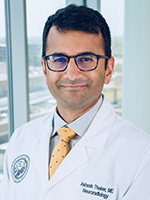
Ashesh Thaker, MD
Chief of Neuroradiology, Denver Health and Hospital
Assistant Professor of Radiology
University of Colorado School of Medicine
Dr. Thaker has studied imaging biomarkers of Alzheimer’s Disease since his neuroradiology fellowship at UCSF. He has collaborated on multiple projects related to neuroimaging at the CU Alzheimer’s and Cognition Center since joining the CU SOM faculty in 2016.
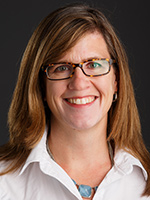
Nichole Carlson, PhD
Director, Center for Innovative Design and Analysis
Department of Biostatistics and Informatics, Colorado School of Public Health
Dr. Carlson is a team scientist collaborative biostatistician. Her methodologic research has focused on Bayesian models of biomedical data and statistical analysis of imaging data. She has also led the development of the campus wide biostatistics and data science resource and research center, CIDA and is Director of the Biostatistics, Epidemiology, and Research Design program of the CCTSI.
Team 6 (Jordan)
Targeting therapeutic vulnerabilities in myeloid pathogenesis
Despite decades of research, chronic and acute forms of myeloid disease are frequently lethal and there remains a significant lack of therapeutic options. Extensive efforts have described the many genetic mutations contributing to myeloid pathogenesis. However, therapies developed from these efforts have largely failed to improve patient outcomes. As an alternative approach, we are focused on two aspects of myeloid disease biology. First, the developmental biology of myeloid disease clearly mirrors the hierarchical structure of normal blood formation, where a relatively small pool of stem cells gives rise to the overall myeloid cell population. Thus, the malignant stem cells giving rise to myeloid disease represent a key therapeutic target. Second, our studies have demonstrated that aberrant regulation of specific metabolic processes is a hallmark of malignant myeloid stem cells. Consequently, we propose that targeting the metabolic features of malignant stem cells represents an important strategy towards improving therapeutic outcomes.

Craig Jordan, PhD
Chief of the Hematology Division, Department of Medicine
Nancy Carroll Allen Professor of Hematology
Dr. Jordan’s work is focused on the characterization and targeting of malignant stem cells in MDS and AML.
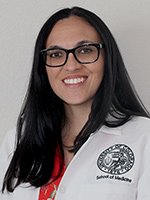
Maria Amaya, MD PhD
Assistant Professor, Division of Hematology, Department of Medicine
Dr. Amaya’s research focuses on developing therapeutic targets for myelodysplastic syndromes by understanding the mechanism of driver mutations and signaling pathways.

Eric Pietras, PhD
Associate Professor, Division of Hematology, Department of Medicine
Dr. Pietras serves as the Associate Chief for Basic Research in the Division of Hematology. His research interests center on understanding the interplay between inflammation and metabolism in promoting myeloid oncogenesis, with the overall goal of establishing new modalities for preventing progression to deadly myeloid malignancies.

Brett Stevens, PhD
Research Associate Professor, Division of Hematology, Department of Medicine
Dr. Stevens’ research explores energy metabolism of myelodysplastic syndrome and leukemia stem cells as a target for the development of novel therapies.

Michael Alberti, MD, PhD
Assistant Professor, Department of Pathology
Dr. Alberti’s research focuses on the genetic and molecular basis of splicing factor gene mutations in the initiation, development, and progression of clonal hematopoiesis and myeloid malignancies.
Team 7 (Lyons)
Breast Cancer Co-Opts Reversible Physiologic Programs of Immune Suppression
The team led by Dr. Lyons aims to reduce breast cancer-related deaths by targeting mechanisms of therapeutic resistance in estrogen receptor-positive breast cancers. (ER+BC) comprise most BC-diagnosed and BC-related deaths. Their group proposes the novel hypothesis that breast cancer cells co-opt normal developmental mechanisms of immune modulation and create a tumor permissive microenvironment that contributes to disease recurrence. Their results are expected to lead to novel mechanistic insights into immunosuppression during normal breast development, which is co-opted by breast cancer. Since immune suppression during pregnancy, lactation, and postpartum mammary involution is controlled and reversible, their studies are designed to identify novel targeted adjuvant therapies to relieve immune suppression and prevent mortality.
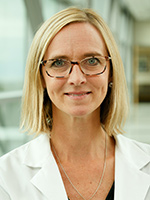
Traci Lyons, PhD
Associate Professor, Division of Medical Oncology, Department of Medicine
The Lyons lab focuses on the mechanisms by which recent pregnancy and developmental changes in the mammary gland promote breast cancer progression and metastasis with an emphasis on the role of the lymphatic system and semaphorin 7a. The overall goal of her research program is to identify novel treatment modalities for patients with recurrent breast cancers.

Virginia Borges, MD
Professor, Division of Medical Oncology, Department of Medicine
Dr. Borges holds the Robert C. and Patricia Young-Connor endowed Chair in Young Women’s Breast Cancer. Dr. Borges is the Deputy-Head of the Division of Medical Oncology, the Director of the Breast Cancer Research Program and the Director for the Young Women’s Breast Cancer Translational Program. Dr. Borges focuses on research in young women’s breast cancer, the interaction of breast cancer and pregnancy and the development of novel drugs for breast cancer.
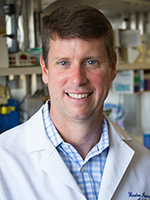
Weston Porter, PhD
Professor, Department of Veterinary Physiology and Pharmacology
Director of the Texas A&M Center for Environmental Health Research, Texas A&M University
The Porter laboratory investigates signaling pathways involved in normal mammary gland development involved in in cell fate and heterogeneity and leverage this mechanistic understanding into therapies for breast cancer treatment.
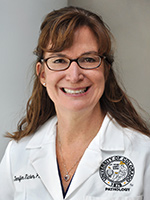
Jennifer Richer, PhD
Professor, Department of Pathology
Dr. Richer has studied steroid hormone receptor action in breast and gynecologic cancers for>25 years and her recently completed two clinical trials targeting androgen receptors in eandocrine therapy resistant primary and metastatic breast cancers. The Richer lab also discovered a mechanism by which carcinomas co-opt a program of immune-suppressive factors typically made by trophoblasts to ensure fetal tolerance during pregnancy.

Jill Slansky, PhD
Professor, Department of Immunology and Microbiology
The Slansky lab studies basic aspects of antigen-specific T cell responses to cancer and the tumor microenvironment with the goal of contributing to prophylactic and therapeutic vaccine development.
Team 8 (Sucharov)
Organ crosstalk in the cardio-pulmonary-renal axis and the effect on heart mitochondrial and cardiac function
The team led by Dr. Sucharov seeks to understand the effect of organ injury on heart mitochondrial and cardiac function. They propose that mitochondrial dysfunction is a central driver of cardiac dysfunction in models of direct cardiac injury as well as injury to remote organs, including the lung and the kidney. The team will investigate the effect of organ injury on cardiac cellular and transcriptional landscape, the contribution of circulating factors to cardiomyocyte dysfunction, and the effect of mitochondria-targeted therapies on cardiac function in in vivo models of organ injury. The team combines expertise in lung (Nozik), heart (Stauffer and Miyamoto) and kidney biology (Faubel), mitochondrial function and treatment with mitochondria target therapy (Stauffer), and role of the secretome on cardiomyocyte biology (Sucharov).

Carmen (Kika) Sucharov, PhD
Professor, Division of Cardiology, Department of Medicine
Dr. Sucharov directs the Pediatric Cardiovascular Research Laboratories and is the Associate Section Head of Research in the Division of Cardiology. Dr. Sucharov’s laboratory is focused on understanding the molecular and cellular mechanisms of heart failure in children with dilated cardiomyopathy, with a special focus on secreted molecules and their contribution to cardiomyocyte pathology.
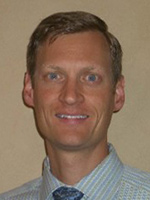
Brian Stauffer, MD
Professor, Division of Cardiology, Department of Medicine
Dr. Stauffer is the Chief of Cardiology at Denver Health and Hospital Authority. He co-directs the Pediatric Cardiovascular Research Laboratories with Drs. Sucharov and Miyamoto. His research interests focus on mitochondrial biology in the human heart and model systems, including the use of mitochondria targeted compounds in clinical tissue.

Shelley Miyamoto, MD
Professor, Division of Cardiology, Department of Pediatrics
Dr. Miyamoto holds the Jack Cooper Millisor Chair in Pediatric Heart Disease. Dr. Miyamoto is a pediatric cardiologist with clinical expertise in the care of infants and children suffering from various forms of cardiomyopathy and heart failure. Dr. Miyamoto co-directs the NIH funded Pediatric Cardiovascular Research Laboratories with Drs. Sucharov and Stauffer. Her interests are in basic and translational research aimed at improving the understanding of the unique mechanisms of heart failure in children.

Sarah Faubel, MD
Professor, Division of Renal Diseases and Hypertension, Department of Medicine
Dr. Faubel is a physician scientist with over 20 years of experience investigating the systemic effects of acute kidney injury, in both patients and murine models. Recent investigations have demonstrated that acute kidney injury results in cardiac energy depletion and dysfunction, which will be further investigated in the collaborative research proposed.
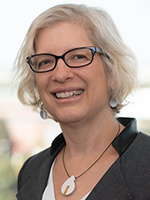
Eva Nozik, MD
Professor, Division of Pediatric Critical Care Medicine, Department of Pediatrics
Dr. Nozik is a pediatric critical care physician-scientist. Her NIH-funded laboratory investigates the contribution of redox regulated signaling to the regulation of pulmonary vascular structure and function, and how disruption in these processes contributes to pulmonary vascular diseases.